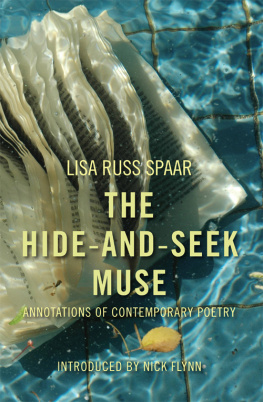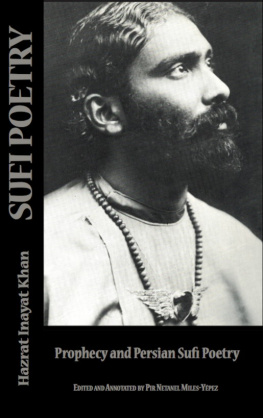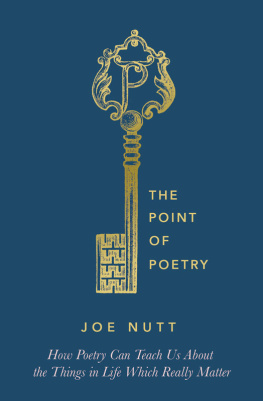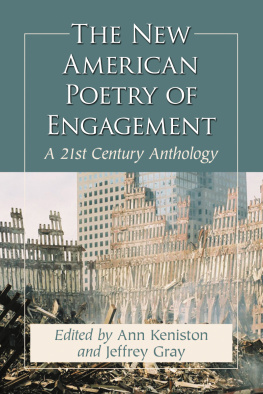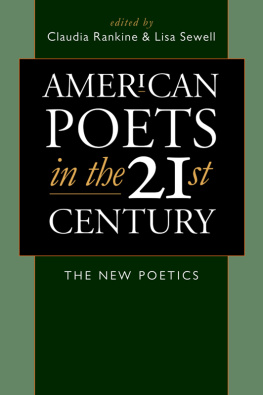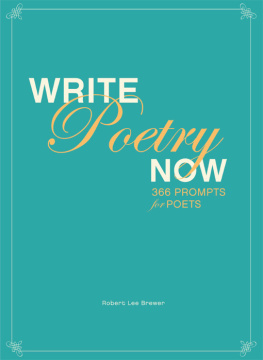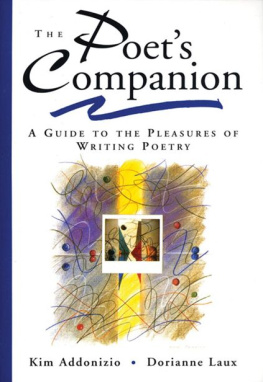THE HIDE-AND-SEEK MUSE:
ANNOTATIONS OF CONTEMPORARY POETRY
BY
LISA RUSS SPAAR
INTRODUCED BY
NICK FLYNN

books by Lisa Russ Spaar
Vanitas, Rough
All That Mighty Heart: London Poems
Satin Cash
The Land of Wandering
Blue Venus
Acquainted with the Night: Insomnia Poems
Glass Town
Blind Boy on Skates
Cellar
books by Drunken Boat Media
Radha Says: Last Poems by Reetika Vazirani (2010)
Copyright 2013 by Drunken Boat Media
All rights reserved under International and Pan-American Copyright Convention. Published in the United States of America by Drunken Boat Media, division of Drunken Boat , international online journal of the arts [].
Cover art from photograph Lung donated and used by permission of Allyson Clay.
Cover Design by Claire Zoghb.
Interior Book Design by Bailey Lewis.
Copyediting and proofreading by David Harrison Horton, Managing Editor, and Ravi Shankar, Executive Director of Drunken Boat .
These essays appeared in earlier form in The Chronicle of Higher Educations Arts & Academe and Brainstorm blogs. This books publication and promotion were made possible in part by grants from the University of Virginia, Central Connecticut State University, from our Board of Advisors and from our loyal readers who contributed during our Kickstarter campaign, made possible by Director of Development, Michele Battiste.
For more information on helping sustain the arts online and out in the world, and to interact with the best multigenre work in one of the worlds oldest electronic journals of the arts, please visit Drunken Boat at [http://www.drunkenboat.com].
Printed by Book Mobile [Bookmobile.com] and available at [Amazon.com]
Library of Congress Cataloging-in-Publication Data
Spaar, Lisa Russ. The Hide-and-Seek Muse: Annotations of Contemporary Poetry.
Drunken Boat Media (2013)
ISBN# 978-0-9882416-0-2 (pbk.)
ISBN# 978-0-9882416-1-9 (ebook)
Drunken Boat ISSN #1537-2812
INTRODUCTION
Nick Flynn, December 2012
This book in your handswhile reading through it for the first time, just now, I very nearly burned the brown rice I was cooking for dinner. I went into the kitchen just now to check on it (the rice)I must have heard something, or smelled somethinga crackle, a burning. Burnt offering, I thought, stirring it. I put the lid on and went back to the world of this book, the book in your hands. I have now lived with it for days, but that first time I got caught up in a poem by Mary Szybist, then a poem by Kazim Ali, then a poem by Joanna Klink. I felt completely alive reading the poems, then reading Lisa Russ Spaars open and generous and brilliant commentary I felt the world opening. The universe is expanding, inexorably pushing into the void, we know this, but its not often you get to feel it. Were living in an incredibly rich time for poetryI tell people that, if asked, and Im never sure if they believe me, or if they understand. A rich, yet essentially invisible moment, for poetry always lives below the surface. I met the director (& personal hero) Jim Jarmusch once, at a dinner party, I told him I was a poet, and he was, or seemed to be, genuinely interested in finding out about this world, and so I promised I would make him a little packet of poems, but I never did. Or, rather, I made the packet, but never found a way to get it into his hands. I never found his hands again. On the other side of us at that dinner was a woman who played cello for the Houston Opera, Jarmusch knew what type of wood her cello was made of (sycamore maple), and why (tone). He asked me if I listened to DJ Screw, the Houston hiphop star who invented the genre known as syrup, so named for the codeine cough syrup he ingested (and which eventually killed him) which made his raps languid. Welcome to Houston. Jarmusch is a hero because were living in a shitty time for Hollywood movies, maybe even for novels from big publishing houses, but poetry (and song) are somehow thriving, thriving in this darkness, like strange beautiful mushrooms. I turned off the flame under the rice potits going to be okay, it will keep cooking in the pot as it cools, it will be perfect. Ive also said, recently, that everything, it seems, is a daily practice, or at least everything that matters, at least everything that matters to me. I get the sense that this book in your hands could become part of a daily practice, that these poems, alongside Lisa Russ Spaars truly thrilling commentary, could be a way to infuse poetry into every moment, or to simply reveal how it is already infused, if we can find the thresholds. I think Ill light some incense, I have a pack of matches in my hand, a black pack of matches with a white mermaid on one side and the word focsle on the other side. Focsle, I believe, is a window in the hull of a boat. A threshold. I want to write Lisa an email, thank her. I want to eat a bowl of short grain brown rice. My daughter is with the downstairs neighbors, watching a movieits movie night. I dont know what movie they are watching, I will ask when she comes back upstairs. I promise if you sit with this book for an hour, or even five minutes, or, even better, play hookie for a day, or stay up later than you should, if you spend some time with this book you will find not what you sought, but something as yet unimagined. Have we been talking all this time? The mermaid matches are still in my hand, my head is in my hand, I keep reading poem after poem, I can smell the sulphur, the incense is waiting, the rice is waiting, they have been waiting all along, as Rilke pointed out in one of the Duino Elegies, how did I forget that? How lucky I am, we are, to have found these hours, these days, these poems, and to have Lisa Russ Spaar as my, as our, Virgil, to lead us through them.
PREFACE & ACKNOWLEDGMENTS
In September 2010, Alexander Kafka, deputy managing editor of the Chronicle of Higher Education Review , asked me if Id be interested in writing as a poetry editor/blogger for a new Arts & Academe on-line poetry feature of the Review . On October 4, 2010, we posted the first of what became a regular offering, Mondays Poema weekly presentation of a new poem by a contemporary American poet, a different poet each week, accompanied by my commentary. Once every month or so from that fall until July 2012, I also wrote a column in which I meditated on some aspect of contemporary poetry. From the start, the venture had no overarching design or program. My only charge was to write about current, compelling poetry for readers who are intelligent and interested in poetry but who might not necessarily be poets. The only other stipulation made by the Chronicle was that I consider for presentation poets with some sort of university or other higher education affiliation and/or who publish with a college or university press. We did not know what to expect when we launched the feature, but Mondays Poem and the monthly columns attracted a devoted following of readers in and outside of the academy, many of them poets. Although no agenda informed these weekly selections, they almost by necessity came to reflect what Ezra Pound called the tone of the time. Whether or not the columns and commentaries articulate the Zeitgeist of American poetry at the start of the second decade of the new millennium, the poems Ive been privileged to present are aesthetically and culturally diverse, representing fresh work by well-known as well as emerging poets from a wide array of formal, political, and other perspectives, all attuned to issues of originality, influence, debt, and innovation that have ever stalked and emboldened American poetry.

